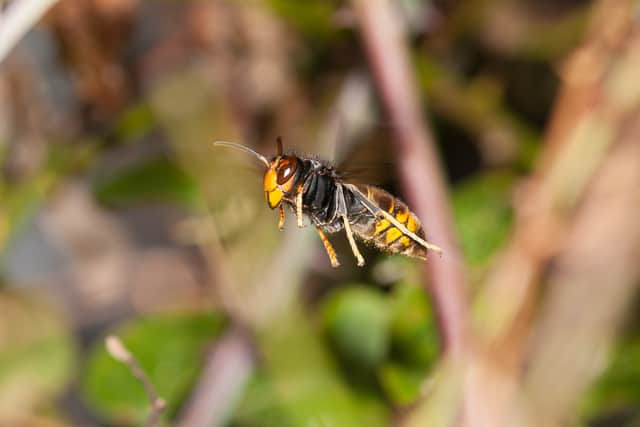Asian hornets UK: what do they look like, where have they been found, advice if you see one - are they deadly?
and live on Freeview channel 276
Killer Asian hornets, whose sting can be venomous enough to send humans into toxic shock, have been spotted in the UK.
The National Bee Unit confirmed the sighting in the Rayleigh area of Essex and issued a warning to the public - and specifically beekeepers.
Advertisement
Hide AdAdvertisement
Hide AdAsian hornets pose a significant risk to honey bee populations and work is underway to find nests and track hornet activity. It is the first sighting since April when a single hornet was spotted in Felixstowe, Suffolk.
There have been reports that native hornets were attacking their Asian counterparts in a war within the species. Observers had reported finding Asian hornets "stung, killed and partially dismembered" by the British variety.


What do Asian hornets look like?
Asian hornets have a mostly black abdomen and characteristic yellow legs - different to Asian giant hornets. They were first spotted in the UK in September 2016 in Tetbury, Gloucestershire.
Their bodies are dark brown or black and they feature a yellow coloured band across their lower end, a bright pale yellow belt at the waist, and yellow on the lower half of their legs.
Advertisement
Hide AdAdvertisement
Hide AdQueens can grow up to 3cm in length, while workers reach up to 2.5cm. They are smaller than the native hornet and can be identified by their darker colour. They pose no greater risk to human health than native wasps and hornets.
The Asian hornet is a species which flies in the day, unlike the European hornet, which stops activity at dusk.
It is a highly effective predator of insects which can cause significant losses to bee colonies, other native species and potentially ecosystems. When the hornets find a bee colony or apiary, they focus on honey bees as their prey.
Are they deadly?
The insects are generally only aggressive towards people when they perceive a threat to their nest.
Advertisement
Hide AdAdvertisement
Hide AdThe species began spreading through Europe in 2004 after arriving in the south of France inside a freight ship, and are increasingly common across the Channel.
The hornets contain a neurotoxin that can kill with a single sting, which could be lethal to someone who is allergic.
What advice has been issued to the public?
The public are advised not to approach or disturb hornet nests as it can provoke attacks by the insects. They can become aggressive if their nest is threatened.
The Department for Environment, Food and Rural Affairs (Defra) said work was already under way to monitor for hornet activity and identify any nests nearby.
Advertisement
Hide AdAdvertisement
Hide AdAnyone who sees an Asian hornet is asked to report it through the ‘Asian Hornet Watch’ app, Defra’s online reporting form or by email.
The ‘Asian Hornet Watch’ app is available to download from the Apple and Android app stores. Those reporting sightings are asked to include a photo if they can safely take one.
Nicola Spence, the Chief Plant and Bee Health Officer at Defra, said: "By ensuring we are alerted to possible sightings as early as possible, we can take swift and effective action to stamp out the threat posed by Asian hornets.
"That’s why we are working at speed to locate and investigate any nests in the area following this confirmed sighting.
Advertisement
Hide AdAdvertisement
Hide Ad"Please continue to look out for any Asian hornets and if you think you’ve spotted one, report your sighting through the Asian hornet app or online."
The costs of eradicating the invasive species on private land will be met by the Animal and Plant Health Agency.
Comment Guidelines
National World encourages reader discussion on our stories. User feedback, insights and back-and-forth exchanges add a rich layer of context to reporting. Please review our Community Guidelines before commenting.
